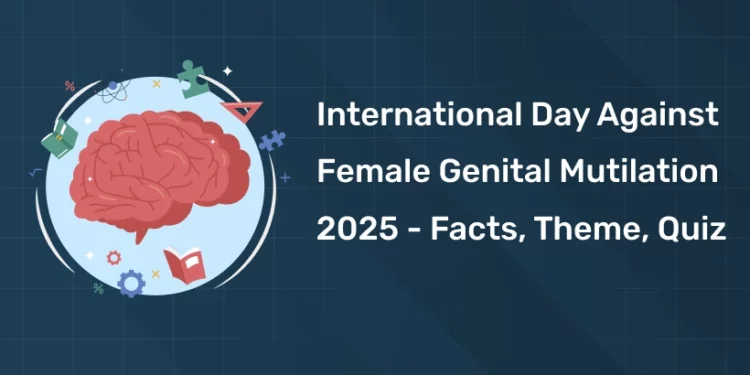Table of Contents
“Together, we can eliminate female genital mutilation by 2030. Doing so will have a positive ripple effect on the health, education and economic advancement of girls and women.” – UN Secretary General Antonio Guterres.
International day against female genital mutilation is observed annually on 6 February to raise awareness about eradication of female genital mutilation. Female genital mutilation is an extreme form of discrimination against women and girls. This practice violates their rights to health, security and physical integrity. It is also a violation of their right to life as in certain cases the procedure results in death.
The United Nations Population Fund (UNFPA), jointly with UNICEF, spearheads the largest global program aimed at the abandonment of FGM. The program currently focuses on 17 African countries and also supports regional and global initiatives.
In 2012, the UN General Assembly designated February 6th as the International Day of Zero Tolerance for Female Genital Mutilation, with the aim to direct the efforts on the elimination of this practice. Reports by a global movement named ‘Every Woman, Every Child’ states that, although primarily concentrated in 30 countries in Africa and the Middle East, Female Genital Mutilation is a universal problem and is also practiced in some countries in Asia and Latin America.
It also continues to persist amongst immigrant populations living in Western Europe, North America, Australia and New Zealand. This practice has been around for more than a thousand years. Over the years, the partnership between UNFPA and UNICEF has been able to make significant achievements.
More than 2.8 million people participated in public declarations of Female Genital Mutilation elimination, and the number of communities establishing surveillance structures to track girls doubled and protected 213,774 girls from undergoing the practice. The goal is to eliminate Female Genital Mutilation by the year 2030.
Female Genital Mutilation
Female Genital Mutilation (FGM) comprises of all procedures that alter or injure the female genitalia for non medical reasons. It is internationally recognized as a violation of human rights, the health and the integrity of girls and women. It has no known medical or health benefits and on the contrary, girls who are subjected to female genital mutilation face severe complications ranging from short term to long term.
Short term complications include severe pain, shock, excessive bleeding, infections, genital tissue swelling, difficulty in passing urine, human immunodeficiency virus (HIV), impaired wound healing and psychological effects such as trauma. The long term consequences affect their sexual and reproductive health and mental health. It causes menstrual problems, keloids, post traumatic stress disorder (PTSD), anxiety disorders, decreased sexual desire and pleasure and obstetric complications.
Facts about Female Genital Mutilation
1: Who was the first woman President of India?
- FGM is an inhuman and degrading violation of the human rights of girls and women.
- It is estimated that to date at least 200 million girls and women globally alive today have undergone some form of FGM.
- Female genital mutilation among girls aged fourteen and younger constitute 44 million of the population of those who have been cut.
- Gambia has the highest prevalence of FGM among younger girls at 56%, then Mauritania at 54% and Indonesia where around half of the girls aged eleven and younger have undergone this practice.
- Somalia has the highest prevalence of FGM among girls and women aged fifteen and above at 98%, second stands Guinea at 97% and Djibouti 93%.
- Sudan, where the most severe type of FGM is performed, had criminalized FGM last year.
Free UPSKILLING Courses!
Take your first step toward mastering in-demand skills, acing interviews, and securing top-tier jobs with Entri's free upskilling courses.
Start Learning!International Day Against Female Genital Mutilation 2025 Theme
The International Day of Zero Tolerance for Female Genital Mutilation, observed annually on February 6, aims to raise awareness and galvanize efforts to eliminate female genital mutilation (FGM). In 2025, the theme is “Stepping up the pace: Strengthening alliances and building movements to end FGM.” This theme emphasizes the critical need for collaboration among various stakeholders, including individuals, communities, governments, and organizations, to accelerate the eradication of FGM.
Here’s a table of recent themes for the International Day of Zero Tolerance for Female Genital Mutilation:
| Year | Theme |
|---|---|
| 2024 | Her Voice. Her Future. Investing in Survivor-Led Movements to End FGM |
| 2023 | Partnership with Men and Boys to End Female Genital Mutilation |
| 2022 | Accelerating Investment to End Female Genital Mutilation |
| 2021 | No Time for Global Inaction: Unite, Fund, and Act to End FGM |
| 2020 | Unleashing Youth Power: One Decade of Accelerating Actions |
| 2019 | Translate Political Decisions into Concrete Actions |
| 2018 | Ending FGM is a Political Decision |
International Day Against Female Genital Mutilation 2025 Observation
The International Day of Zero Tolerance for Female Genital Mutilation is a day of international observation. This day is a part of a combined effort by the UN to meet one of its Sustainable Development Goals, in which the elimination of FGM is a key target under Goal 5. People should come forward to educate the communities about human rights, gender equality, sexual education and attention to the needs of women and girls. On 6 February, you can be part of the online conversation and participate on social media using our their official material. You can also share the hashtag ‘#Act2EndFGM!’ with the world to create awareness.
In the past two years ,the coronavirus pandemic, population growth, and economic deprivation have hindered efforts to prevent female genital mutilation and as a result an estimated two million more girls over the next decade may be subjected to this practice than before the pandemic times.
The World Health Organization has said that “Though the practice has persisted for over a thousand years, programmatic evidence suggests that FGM/C can end in one generation.” Each and every individual can contribute in their own way to bring an end to this non humanitarian act. There should be action at all three levels – international, national and local.
Download Entri app to read more such interesting articles
Quiz on Female Genital Mutilation (FGM)
Q1. What is female genital mutilation (FGM)?
Q2. What are some short-term complications of FGM?
Q3. In which regions is FGM primarily concentrated?
Q4. How has the global prevalence of FGM changed over the last three decades?
Q5. How many girls are at risk of undergoing FGM this year?
Q6. What factors could potentially reverse progress toward eliminating FGM?
Q7. What is one key approach to eliminating FGM?
Q8. How many women and girls alive today have undergone FGM?
Q9. What key elements are crucial in efforts to eliminate FGM?
Q10. What is the ultimate goal regarding FGM by the year 2030?












